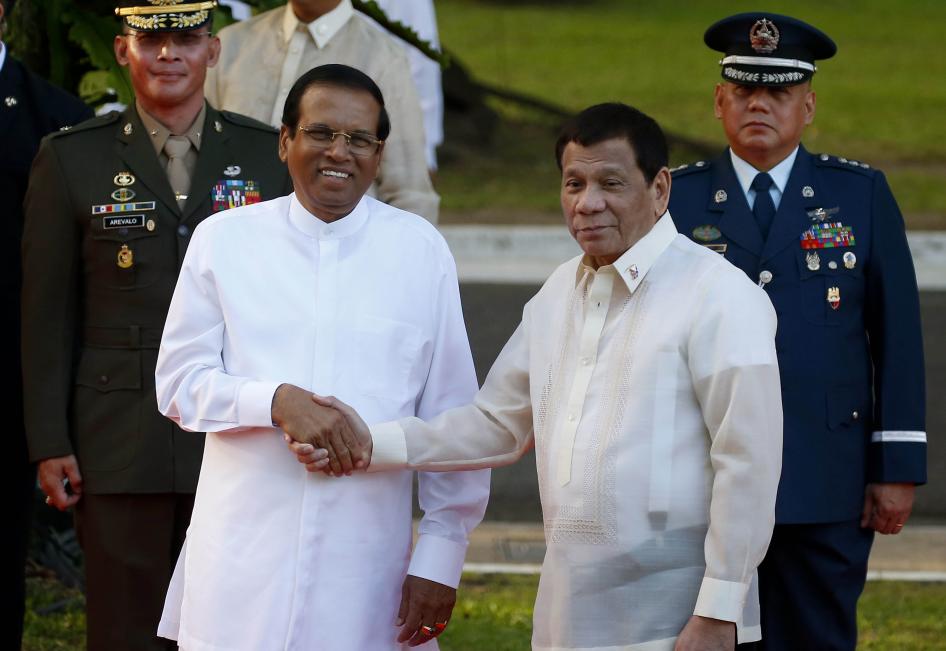The Sri Lankan government should drop plans to resume executions, which would end an unofficial 43-year moratorium in the country, Human Rights Watch said today. On March 31, 2019, President Maithripala Sirisena said that a date had been set to resume carrying out the death penaltyin drug trafficking cases.
Sirisena renewed calls for the death penalty following a visit to the Philippines in January, during which he called President Rodrigo Duterte’s “war on drugs” an “example to the world.” In March, the United Nations high commissioner for human rights, Michelle Bachelet, reported to the UN Human Rights Council that up to 27,000 people have been killed in the Philippines’ anti-drug campaign. The UN, nongovernmental organizations including Human Rights Watch, and the media have linked the killings of alleged drug dealers and users to the police and police-backed vigilantes.
“There is no reason to bring the death penalty back to Sri Lanka after a four-decade moratorium,” said Meenakshi Ganguly, South Asia director at Human Rights Watch. “President Sirisena’s decision to restore the death penalty because he was inspired by the Philippine’s murderous ‘drug war’ may be the worst possible justification and would violate international law.”
The death penalty has not been carried out in Sri Lanka since 1976. Currently, 1,299 prisoners – 1,215 men and 84 women – are on Sri Lanka’s death row after having been convicted for capital offenses, including 48 for drug crimes. In February, the government began advertising in local newspapers for a hangman, seeking male candidates between ages 18 and 45 with “excellent moral character” and “a very good mind and mental strength.”
The alleged deterrent effect of the death penalty has been repeatedly debunked, Human Rights Watch said. In 2015, the UN assistant secretary-general for human rights, Ivan Šimonović, stated that there was “no evidence that the death penalty deters any crime.” Even with respect to murder, an Oxford University analysis concluded that capital punishment does not deter“murder to a marginally greater extent than does the threat and application of the supposedly lesser punishment of life imprisonment.”
The UN has also opposed the use of the death penalty for drug-related crimes. In a March 2010 report, the UN Office on Drugs and Crime called for an end to the death penalty and specifically urged member countries to prohibit the use of the death penalty for drug-related offenses, and called on countries to take an overall “human rights-based approach to drug and crime control.” In its 2014 annual report, the International Narcotics Control Board, the agency charged with monitoring compliance with UN drug control conventions, encouraged countries to abolish the death penalty for drug offenses.
Imposing the death penalty for drug offenses would violate Sri Lanka’s international human rights obligations, Human Rights Watch said. The International Covenant on Civil and Political Rights, to which Sri Lanka is party, states in article 6 on the right to life that the death penalty “may be imposed only for the most serious crimes.” The UN Human Rights Committee, which monitors state compliance with the covenant, said in a 2018 general comment that “most serious crimes” applies “only to crimes of extreme gravity, involving intentional killing. Crimes not resulting directly and intentionally in death, such as … drug … offences, although serious in nature, can never serve as the basis, within the framework of article 6, for the imposition of the death penalty.”
Sri Lanka was one of the first countries in South Asia to cease carrying out the death penalty. In December 2018, Sri Lanka joined 120 countries at the UN General Assembly that voted in favor of a resolution on the “Moratorium on the use of the death penalty.” Only 35 countries voted against the resolution. Human Rights Watch opposes the death penalty in all circumstances because it is inherently cruel and irreversible.
“The Sri Lankan government should publicly recommit to its moratorium on the use of the death penalty with a view to permanently abolishing the practice,” Ganguly said. “Executions, whether imposed by a judge or carried out unlawfully by the police, are not the way to address drug offenses.”




